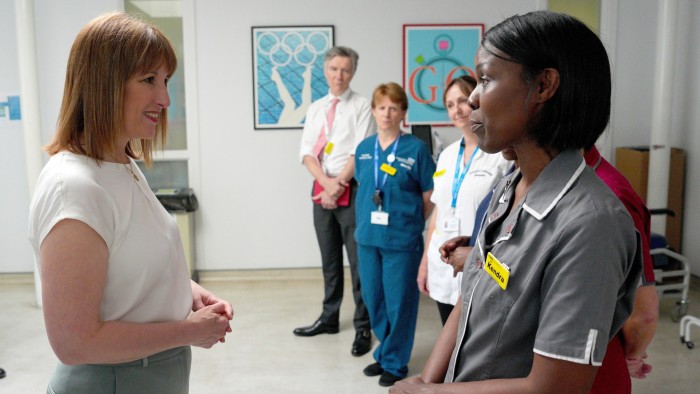Unlock the Editor’s Digest for free
Roula Khalaf, Editor of the FT, selects her favourite stories in this weekly newsletter.
UK chancellor Rachel Reeves will be forced to raise taxes again in the autumn to meet her fiscal targets despite outlining the fastest rise in local levies for two decades in Wednesday’s spending review, experts have warned.
Andy King, a former top official at the Office for Budget Responsibility, said the spending plans that were now “inked in” left ministers with few levers to pull to fill the fiscal hole expected to be caused by higher government borrowing and meagre economic growth.
Relaxing rules on government borrowing would be “very risky” because of the way bond investors view the UK, while reneging on manifesto promises not to raise tax would be “brave bordering on courageous”, he said.
“Something important may have to give if there’s a material fiscal hole,” he added. “The writing is on the wall.”
An unexpectedly sharp drop in economic activity in April, combined with more government borrowing than expected, increases the risk that Reeves’ £9.9bn of financial headroom will be wiped out ahead of the autumn budget, forcing her hand to raise more revenues.
Paul Johnson, director at the Institute for Fiscal Studies (IFS), said: “With spending plans set and ironclad rules being met within a gnat’s whisker, any move in the wrong direction would almost certainly spark more tax rises.”
Reeves herself refused to rule out tax rises on Thursday. “No chancellor is able to write another four budgets in the first year of a government . . . given . . . how much uncertainty there is in the world at the moment,” she told the BBC.
The chancellor insisted that the spending plans, including an extra £113bn of capital spending, were fully funded under the existing budget.
However, the increase in “spending power” that Reeves announced for local government and policing depends on English local authorities choosing to raise council tax by 5 per cent, the maximum allowed.
If councils opted to do this, bills would rise at the fastest rate over any parliament since 2001-05, added Johnson.
The strain follows years of Whitehall budgets rising faster than the economy. From 2019 to 2024, departmental spending rose 3.6 per cent a year; Reeves’ plans imply average real terms growth of 2.3 per cent until 2029.
“This is not a period of austerity,” said Johnson. Capital spending in particular will stay relatively high as a share of national income.
However, the emphasis on health and defence will result in big strains elsewhere, he said. The schools budget will be flat, once the expansion of free school meals is excluded.
The NHS was touted as the big winner from Wednesday’s spending review. By the end of the decade, it will account for just under half of day-to-day departmental spending, compared with a third in 2010.

The chief reason the government has not yet had to confront even more difficult choices is that the OBR has been persistently more optimistic than other forecasters on the economy’s long-term growth potential.
The OBR said in March its central forecast for GDP growth from 2024 to 2029 was 0.8 percentage points higher than the average of other forecasters.
James Smith, research director at the Resolution Foundation, said a likely downgrade in the OBR’s trend growth assumption would be “disastrous” for the fiscal outlook, because it would show “that the structural deficit is much higher than we thought and we need to raise taxes”.
The OBR was so far out of line with the consensus, King said, that if he had still been at the watchdog, “I would have looked at that forecast again” rather than publishing the one presented in March.
In the autumn, the OBR would need to factor in the impact of new workers’ rights, changes to immigration rules that would hold back growth and the fact that tax and minimum wage increases “look to have done much more damage to employment than was allowed for”, said Smith.
Economists say that boosting capital spending by 3.6 per cent over the parliament — more than double the rate of day-to-day spending — may help the economy in the long run, especially where investment is channelled into new transport projects or research and innovation.
However, the focus on defence and net zero means the boost to GDP will be smaller than one might have expected, which the IFS’s Johnson said was surprising “when the government had made growth such a big part of its agenda”.
Data visualisation by Keith Fray






